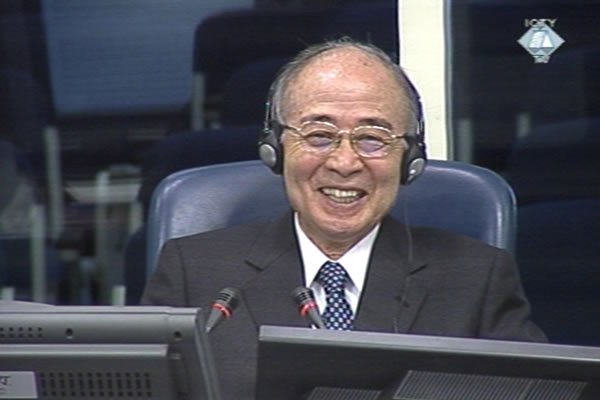Home
AKASHI TESTIFIES AS DIPLOMAT
After 18 years Yasushi Akashi and Radovan Karadzic met again, this time in the Tribunal’s courtroom. Karadzic was in the dock, Akashi was in the witness stand. The former UN Secretary General’s special envoy was cautious and diplomatic in his answers to the former Republika Srpska president
 Yasushi Akashi, defence witness of Radovan Karadzic
Yasushi Akashi, defence witness of Radovan Karadzic Yasushi Akashi, the UN Secretary General’s special envoy in the former Yugoslavia, was very cautious and diplomatic in his answers to Radovan Karadzic’s questions. At the beginning of the examination-in-chief, Karadzic asked Akashi ‘which warring faction had a vested interest in prolonging the war in BH’; the answer clearly showed that Karadzic would find it hard to get the answers he wanted.
‘I think that the situation in the former Yugoslavia was very complicated…’, Akashi said at the beginning of his answer and went on to explain why there were many different reasons for the long war in Bosnia and Herzegovina. The reasons were rooted in internal and international situation, politics, economy, society, history and many others segments, Akashi said. ‘The opinions on the issue differ’, Akashi concluded diplomatically.
As Akashi explained, at the beginning of the conflict Serbs held over 70 per cent of the BH territory. This was why the ‘Serb side wanted a long-term cease fire while the Bosnian government was against’ freezing the status quo, Akashi explained.
In 1994 and 1995, Karadzic and Akashi met about 20 times. As the Japanese diplomat explained, the meetings were valuable to him because he could learn about the Serb side’s positions. That is why he was grateful to Karadzic ‘although I didn’t quite agree with’ all of Karadzic’s views.
In his testimony, Akashi recalled a meeting with Karadzic in Geneva when they discussed the crisis in Gorazde. As Akashi said, he was upset because Karadzic was telling him one thing, and later on he saw that something completely differed had happened in the field. When Akashi was asked if he as the ‘civilian chief of the military forces could always achieve everything’, he answered ‘I could at least be sure that UNPROFOR would obey the orders from their superiors’.
Karadzic tried to convince Akashi in court once again that the Gorazde crisis was brought about by the attacks of the enemy troops on the Serb positions. Karadzic said that his forces ‘had to’ responded. ‘They attacked, we defended ourselves, then they started crying’, Karadzic told Akashi. The witness nevertheless replied that he was not convinced it happened that way. This generalization ‘does not apply to all situations’, Akashi argued.
When Karadzic asked Akashi about the Markale incident in February 1994, he referred to the conclusion of an expert team Akashi himself had founded: that the shell could have been fired either from the Serb side or the BH Army positions. Karadzic reminded Akashi that he and Stanislav Galic had been trying to convince Akashi that the BH Army had fired the round. ‘But I didn’t expect you to proffer a different opinion’, Akashi replied.
Karadzic also wanted to know if generals MacKenzie and Briquemont ever told Akashi that the Bosnian side in Sarajevo opened fire from positions near public and vulnerable facilities, such as hospital and schools, to provoke the Serb side into responding. Akashi heard Briquemont and some other high-ranking UN officials in Sarajevo mention it.
Tomorrow morning Karadzic will complete Yasushi Akashi’s examination-in- and Akashi will be cross-examined by the prosecution.Linked Reports
- Case : Karadzic
- 2013-04-23 SUBPOENA FOR GENERAL ZIVANOVIC
- 2013-04-23 BOTH KARADZIC AND MLADIC IN COMMAND OF ARMY
- 2013-04-22 WHAT IF GALIC KNEW ABOUT CRIMES
- 2013-04-25 AKASHI: KARADZIC’S NONCHALANTLY DISTORTED TRUTH
- 2013-05-07 FOOLS WHO TARGETED SARAJEVO CIVILIANS
- 2013-05-08 GALIC: OTHERS ORCHESTRATED SARAJEVO DRAMA
